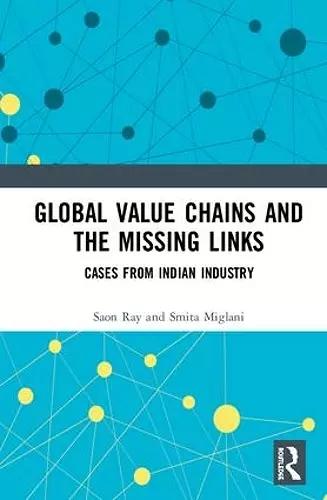Global Value Chains and the Missing Links
Cases from Indian Industry
Saon Ray author Smita Miglani author
Format:Hardback
Publisher:Taylor & Francis Ltd
Published:15th May '18
Currently unavailable, and unfortunately no date known when it will be back
This hardback is available in another edition too:
- Paperback£41.99(9780367734503)

Global value chains (GVCs) are fraught with the phenomenon of fragmentation and dispersion of production across the world. India presents a unique example with its high potential in manufacturing capability but low integration in GVCs. This book examines the reasons why India has failed to integrate within GVCs so far and looks at key examples to understand the impediments in this process. The chapters bring together case studies from across the manufacturing industry – labour-intensive (garment, paper and diamond), capital-intensive (automobile and petrochemical), and knowledge-intensive (semi-conductor microchip, chemical and pharmaceutical) sectors. Together, they present stories of successful integration of some firms in GVCs as well as the difficulties faced by them. The volume also highlights the importance of GVCs in the context of developing countries in terms of benefits such as income and value generation, knowledge and technology collaborations, and advances in systems and processes.
This book will interest scholars and researchers in economics, international trade studies, development economics and business management as well as to practitioners, policymakers, government officials, and those in the corporate sector.
‘Effective participation in the Global Value Chains is indeed one of the most missing elements of India’s international trade. We started at independence as an inward-looking country with emphasis on 'import substitution' as the primary goal conserving foreign exchange to import the only the most essential goods. This licence permit raj of management had reached its limits and we ended up promoting inefficiencies, poor quality and high costs through this protectionism. We moved to the next phase in 1991 effectively opening up trade with 'export promotion' replacing our earlier policy of 'import substitution'.
But so far as being part of an international chain of value addition, thus, importing raw materials or intermediate goods and re-exporting them after processing is concerned, we have miles to go. Schemes such as SEZs, EOUs, EPCG, Advance Authorisation schemes are steps in this direction. However, we have not become a major player in the Global Value Chains. The reasons for this situation are much more than mere EXIM policies or Customs procedures. The entire range of issues which the participating organisations have to deal with including infrastructure, finance, time taken to clear the goods, transport them to the factories and to re-export them need to be looked at. This book precisely and wonderfully does that. It is absolutely opportune that such a study is made at this time in the country.
In addition to identifying the problems in general, it is important to study specific industries and their problems and issues if the studies have to be meaningful and this is the second biggest contribution of the book. I am confident that the book will be extremely useful for policymakers, practitioners, researchers and trade alike and it will encourage others to conduct more studies covering a larger number of industries.’
P. V. Subba Rao, IRS (C&CE), Joint Secretary (COFEPOSA), Department of Revenue, Ministry of Finance, Govern
ISBN: 9781138709027
Dimensions: unknown
Weight: 453g
268 pages